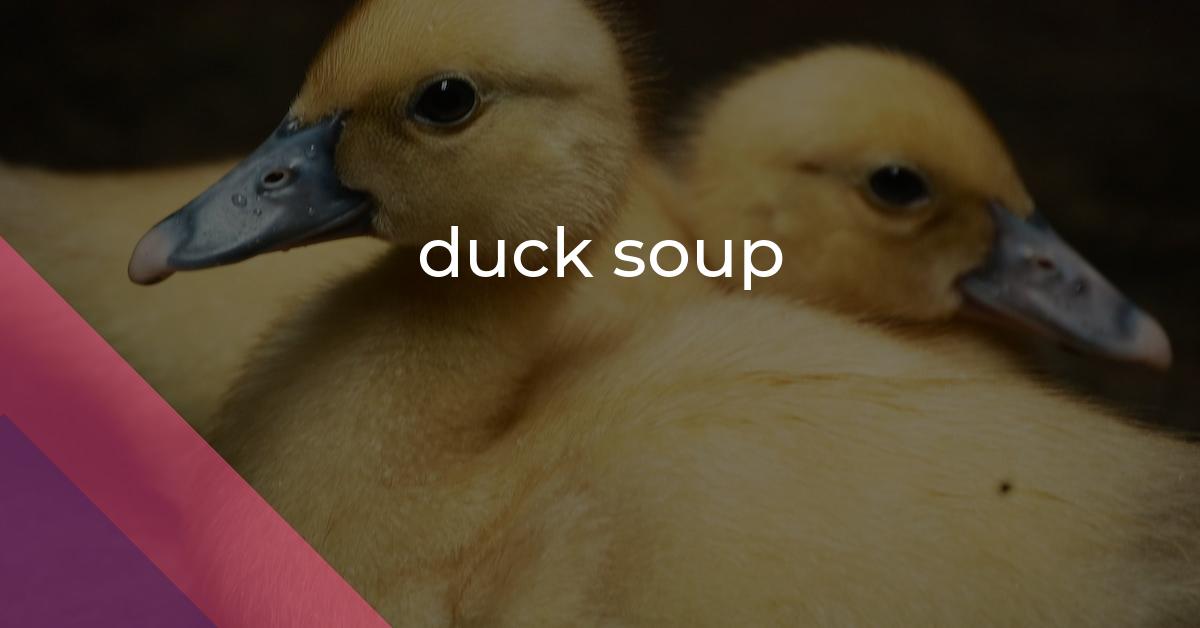duck soup: Idiom Meaning and Origin
What does ‘duck soup’ mean?
The idiom "duck soup" means something that is very easy or simple to do.

Idiom Explorer
The idiom "soup sandwich" refers to something that is extremely messy, disorganized, or chaotic. It implies that the situation or thing is in such a state that it is completely unmanageable or difficult to fix.
The idiom "just like that" means to do something in a sudden, effortless or simple manner, without any difficulty or hesitation.
An idiom meaning to do something quickly and efficiently, often describing the completion of multiple tasks or actions in a single swift and decisive motion.
The idiom "in a flash" means doing something very quickly or almost instantly.
The idiom "have one's ducks in a row" means to be well-prepared and organized, with everything in its proper place or order.
The idiom "greasy spoon" refers to a small, inexpensive, and often unsanitary restaurant or diner that serves simple, greasy food.
The idiom "go without saying" means that something is so obvious or well-known that it doesn't need to be stated explicitly.
The idiom "goose is cooked" means that a person or situation is in a dire or hopeless position, with no chance of escape or success.
The idiom "good enough to eat" means something is extremely delicious or attractive, to the point where one might want to consume or devour it.
"From soup to nuts" is an idiom used to describe a comprehensive or complete range of things or activities, covering everything from the beginning to the end.
Understanding 'Duck Soup' Mastery
The idiom "duck soup" is a well-known phrase in the English language. It is often used to describe a situation or task that is very easy or effortless. The origins of this idiom can be traced back to the early 20th century.
One prominent theory suggests that the idiom "duck soup" may have originated from early theater or vaudeville performances. During these performances, comedians would use props and visual gags to entertain the audience. One such gag involved a large bowl of soup with a rubber duck floating in it. The comedian would pretend to struggle with the soup, making a humorous spectacle out of something that should have been simple. This act may have led to the creation of the phrase "duck soup," as a way to describe something that appears to be challenging but is actually quite easy.
Another theory suggests that the phrase "duck soup" may have been influenced by the traditional Chinese dish known as "hot and sour soup." This soup is typically made with duck meat and is known for its bold flavors. The idea of a soup that is both flavorful and satisfying may have contributed to the association of "duck soup" with something that is enjoyable and easily accomplished.
Over time, the phrase "duck soup" became more widely used in popular culture. It was first recorded in American newspapers in the 1920s, indicating that it had already become a familiar idiom by that time. The idiom gained further recognition in 1933 with the release of the Marx Brothers film, also titled "Duck Soup." This comedic film portrayed the absurdity and hilarity of political situations, further cementing the idiom's association with ease and simplicity.
Today, the idiom "duck soup" continues to be used in various contexts. It is often employed in casual conversation to describe a task or situation that is effortless or uncomplicated. For example, someone might say, "Oh, don't worry about that, it's duck soup!" to reassure a friend that a task is easy to accomplish. The idiom has also been referenced in literature and other forms of media, further solidifying its place in the English language.
Let's now explore how "duck soup" is related to four other idioms: "soup sandwich," "duck down," "chicken feed," and "all duck or no dinner." Each of these idioms has its own unique meaning and usage.
"Soup sandwich" is an idiom that is often used to describe something that is incredibly messy or disorganized. The phrase implies that the situation is so chaotic that it resembles a sandwich that is filled with soup instead of the usual ingredients. It is almost like trying to consume a sandwich that is impossible to eat without making a mess. This idiom is quite the opposite of "duck soup," as it signifies a situation that is difficult and complicated.
"Duck down" is another idiom that has a different meaning from "duck soup." When someone "ducks down," it means they are crouching or bending down to avoid being seen or hit. This can be a defensive action, used to protect oneself or evade danger. While "duck down" and "duck soup" both contain the word "duck," their meanings and usage are very distinct.
"Chicken feed" is a colorful idiom that refers to a small or insignificant amount of money, possessions, or resources. It suggests that the amount is so small that it is only suitable for feeding chickens rather than for any significant purpose. While "duck soup" and "chicken feed" both incorporate animals in their idioms, they convey different ideas - "duck soup" represents something easy, while "chicken feed" signifies something negligible.
The idiom "all duck or no dinner" conveys the idea that someone must be completely committed or fully involved in a task or endeavor in order to succeed. It emphasizes the importance of being fully dedicated and not holding back. This idiom contrasts with "duck soup," as it implies that the task at hand requires significant effort and commitment rather than being effortlessly achievable.
The idiom "duck soup" is a well-known phrase that is used to describe something as very easy or effortless. Its origins can be traced back to early theater performances and it has gained widespread usage in popular culture over time. The idiom has also been referenced in literature and other forms of media. While "duck soup" is associated with ease and simplicity, four other related idioms - "soup sandwich," "duck down," "chicken feed," and "all duck or no dinner" - have distinct meanings and usage. Each of these idioms conveys different ideas and adds diversity to the English language.
Example usage
1. The math test was duck soup for him. He finished it in half the time given and aced it.
2. As an experienced chef, making a three-course meal is duck soup for her. She can prepare the entire meal effortlessly.
3. After years of practice, skateboarding tricks have become duck soup for him. He can effortlessly perform complex tricks without any hesitation.
More "Expression" idioms



